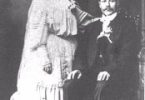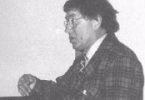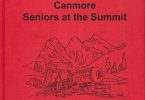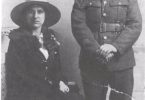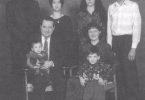I was born in Liverpool, England, on February 12, 1932, the eldest of three children. A sister was born in 1934 and brother in April, 1937. My growing years were spent in Liverpool, at that time a thriving port. Ships, shipbuilding and repairing were part of this city.
As a child, before the Second World War, I spent much time being taken across the Mersey on ferries, hiking with my father at a very early age and being a total nuisance in the library with my grandfather! I started school at age four and enjoyed music and movement for infants. I also enjoyed playing instruments – I always wanted to play a drum instead of a triangle but, in those days, drums were the instruments for boys!
My love of music has stayed with me all my life and I particularly enjoy classical music, the opera and brass bands. Live theatre has always been a favourite, too, from a very early age. One of my earliest and most precious memories was being taken by my maternal grandmother, a woman of sterling quality, to the Wesleyan Methodist Church she attended and learning to sing “All Through The Night”. My grandmother became my mentor and dearest friend, to whom I always went for advice and, as a teenager, to criticize my mother! She always knew what to do or say in most situations. It is to her that I owe my forthrightness today. She told me that I was always to hold my head high in whatever circumstances I found myself because I was a Celt!
I was an inquisitive and adventurous child. On being sent on an errand to buy soap (the store being very close to my home), on my way home I went into the Roman Catholic Church, which was next door to home, and washed my handkerchief with the soap in the little vessel which held Holy Water! My mother had deal of explaining to do to the priest! On another occasion, the day my sister was born and my father was ill with pneumonia, I was sent to get a paper. With the twopence I was given, I bought a penny paper and then decided to take a tram to the Pier Head to the ferries. The conductor on the tram eventually realized I was younger than I looked and didn’t need a scholar’s ticket, as it was called. He put me in the care of a Salvation Army Officer who happened to be on the tram. The officer took me to the Dingle Police Station. My mother came to collect me, but I was happy enough sitting on a high stool eating biscuits and drinking tea and informed my mother I was not ready to leave yet. On returning home, another policeman cautioned me that if I did this again, he would have to take me away. My reply was “That’s all right, I love policemen!” His advice to my mother was to let this girl be adventurous. I still am, hence my love of travelling.
On September 3, 1939, Britain declared war on Germany. I was seven years old. Although the war years forever changed my growing up, I believe I learned to be responsible and, even then, life still went on as usual. Most of my school time was spent in and out of air-raid shelters. However, I did learn!
From 1940-1946, I was quite ill and at one point was sent to a convalescent home in a place called Southport, outside of Liverpool. This was not a pleasant experience – away from my loving family, and having to go down an outside iron fire escape most nights to an underground air raid shelter. We made the most of it by giving concerts, to the amusement of the staff. However, with that came a certain confidence about singing in a group and learning to live with other children.
We were taken to church in a long “crocodile” (i.e., line) – Catholics went one way and all those of other faiths were herded to the Congregationalist Church. The service was different than my Anglican tradition. We were offered Communion and I kept insisting I was not confirmed but to no avail. It was during this service that as “pushed” to do, I went forward and “gave my heart to God.” In doing so at that time, I felt safe and seemed to be less afraid of bombs. This safe feeling has remained with me all my life.
As the eldest of three, I was afforded certain responsibilities and privileges, some of which I enjoyed and others not! I used to take my sister and brother on picnics to the nearby park where the Italian prisoners of war were put to work. They loved to talk to us children. We also went across the Mersey on board the Birkenhead Ferry for a penny, then walked a fair distance to a pleasurable place called New Brighton to play on the sands. I had prepared the picnic fare. Halfway to New Brighton, we stopped at a trucker’s cafe where you could get a penny crust with margarine, or a halfpenny crust without anything on it. We chose the latter to “put us on” until we got to the picnic stage.
My parents were good, hardworking people. Even in wartime, we had piano lessons, tap dancing, etc. Even though our pleasures were simple, it all seemed wonderful. We joined Brownies and Girl Guides and my brother, Cubs and Scouts.
My father kept a wonderful garden full of every kind of vegetable and we also kept hens. A blackcurrant hedge and dessert gooseberry bush divided the vegetable garden to afford a lawn with well-tended flower borders, and, best of all, a free place for us children to ride tricycles and give concerts to grownups. Besides our garden, we had what is known in Britain as an “allotment” (gardening plot), and also known as a “Victory Garden”, where even more vegetables were grown.
We were lucky that even as the bombing became much heavier and the street next to ours was razed to the ground, we escaped this. There was one time we were buried alive in our air raid shelter when an aerial torpedo demolished the house next-door-but-one to ours. My father, on air raid duty, dug us out of the shelter. We then, in the small hours of the morning, had to go as we were on the tram to stay with my grandmother.
We were there for three weeks, with my mother putting us on a tram to attend school – a half hour journey daily. Luckily, the torpedo was sabotaged, so did not go off! This was probably thanks to the work of the Resistance Movement.
The joyful sound of church bells heralded the end of World War II – gone were the blackout curtains and flashlights although not food and clothing rationing for a few more years. We celebrated with a V.E. Day party in our street. My memory reminds me that my grandmother made sixty-five jam tarts to supplement all the other goodies people made!
I left school at age fourteen and attended Commercial College to learn shorthand and typing (but ironically did not receive my diploma because the factory that churned them out had been bombed!). After nine months, the head of the college recommended me to several employers. At age fifteen, I started work as a private secretary to a marine engineer. There I remained in a most interesting job until I met my husband. We got engaged (on the top deck of a ferry across the Mersey) after six weeks, and were married within the year.
John, my husband, and I watched our house being built in a place called Barnston, on the Wirral Peninsula in Cheshire. We moved in after our honeymoon in June, 1958. Ten and a half months later, our first daughter was born. Two and a half years later, we had a second daughter. Then our family was made complete when we adopted our third daughter.
After eight years of living in Barnston, my husband, a professional engineer who headed a Transmission Division at Automatic Telephone and Electric Co., in Liverpool, got news that the Transmission Division would close. Plessey had taken over the company. The jobs offered in management were not considered to be viable by my husband. Northern Electric Co., (soon to be Bell Northern Research & Development) offered my husband a job with them in Ottawa, Canada.
We were due to fly to Ottawa on April 5, 1966. By this time, we had sold our house on the Wirral and were living in Liverpool with my parents. The children developed chicken pox so were not allowed to fly! John left on April 5 and we followed on April 16. In Ottawa, we settled down and my husband worked at Bell Northern Research & Development as a member of the scientific staff, until his early retirement in 1986. He was now able to add “house husband” to his resume, as I was still working!
When we first arrived in Ottawa, I stayed home with our children. I worked in the community as a volunteer for many years and, to this day, my children say that everything nice in the fridge was either for the jail or the church! Not true! I worked for the Elizabeth Fry Society, becoming chairperson of jail visiting, which meant taking in new visitors (I was a so-called “jail mother”), orienting and screening interested people to become volunteers, etc. Sometimes I was being put in very awkward situations at the jail, about which I later laughed. I took Pastoral Care training with Rev. Dr. John Swift at a nearby hospital and worked through my church (United Church of Canada) on a Pastoral Care Team for many years.
In my late forties, I went to work for a Community Services Centre, through Regional Social Services. I also took part-time basic counselling studies at St. Paul University in Ottawa. This enabled me to work training people on a Social Services Employment Program, to enable them to return to the work force. I also worked with a crisis intervention team, seeing clients one day a week. There were many facets to this job and I enjoyed the challenge for a long time to come.
My church claimed the rest of my time! I worked as Chairperson of the Social Action Committee, and covered a Needs Study of the community through a Canada Works Grant, which produced a report “Can the Church Serve the Community?” I also ran a food pantry to help those in need. As needs became more demanding, I coordinated a community lunch program in a rent-geared-to-income housing community, and helped orient those living there to learn to cook and help serve meals. The latter, although making me sometimes quite sad at situations I came across, also, was the “best medicine” for laughter and understanding.
In 1980, I headed up a Refugee Committee and walked along with two Vietnamese families, under the auspices of our church. To this day, one of the families now living in Toronto still keeps in touch with me.
My partner of thirty-four years died quite quickly of cancer in 1992. Following his death, there were many changes to my work, so I took early retirement in 1994. I moved to an apartment in the west end of Ottawa, which was home to me. After eighteen months, and much travelling for holidays in Canmore to visit with my daughter, her husband and family, I felt the “pull” of the mountains and decided to come and look where I could live, in late 1995.
Come March, 1996, I made my move to live at Elk Run. This was not suitable for me so I moved downtown to St. Michael’s condominiums and feel I made the right decision. I have been made welcome in Canmore, making many good friends. I enjoy walking, Tai Chi, social time and a good game of Scrabble. I am continuing to learn and grow.
I am more than grateful for my family here in Canmore and elsewhere. I have six wonderful grandchildren, two of whom live in Canmore. In spite of major illness these last three years, I have been, to some degree, able to reciprocate my family’s caring by, on occasion, looking after and enjoying my two grandchildren here in Canmore. Major illness these last three years has not daunted me. I am presently prepared to go on my next odyssey to the Passion Play in Oberammergau and to visit Vienna, Venice, Florence and Rome in May of this year.
I feel truly blessed to live in this wonderful place called Canmore.
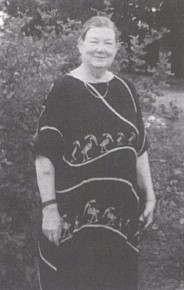
Gwen Spencer in Ottawa
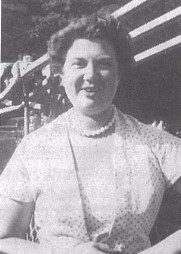
Gwen Spencer at the Chain Bridge, Llangollen, Wales, 1955
In Canmore Seniors at the Summit, ed. Canmore Seniors Association, 2000, p. 280-283.

